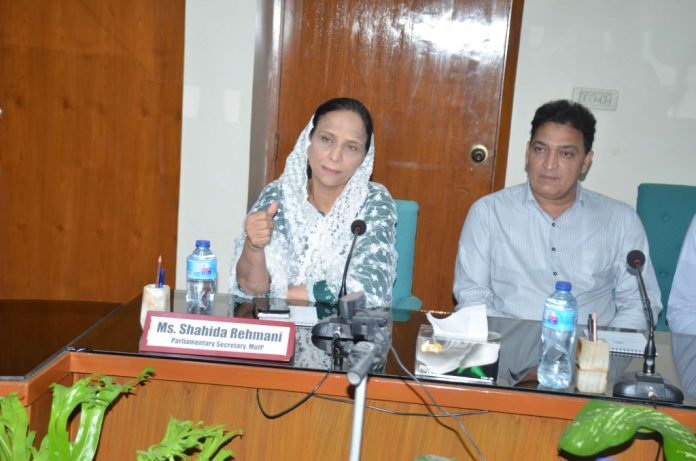By Hina Kiyani
ISLAMABAD: Parliamentary Secretary for Industries and Production, Shahida Rehmani on Wednesday said the National Assembly Standing Committee on Climate Change had proposed the federal government to make maximum budgetary allocations to the Climate Change Division in the upcoming budget due to the country’s growing vulnerability owing to environmental degradation.
She was addressing the consultative workshop in connection with World Environment Day celebrations titled “Pakistan’s Climate Budget 2022-2023” organized by the Center for Peace and Development Initiatives (CPDI).
MNA Rehmani said that the climate budget of the country demanded a holistic approach that endeavoured for a nexus of government, policy makers, academia, civil society and local communities for a unified efforts towards addressing environmental degradation and its associated risks. She said there was lack of intention and individual will among the stakeholders to act against climate change and threats of natural calamities derived by the human activities. The Parliamentary Secretary underlined that in order to curb the menace of plastic pollution and ecosystem degradation it was imperative for the society as a whole to return to the abandoned practices of eco-friendly solutions like reusable cotton bags and other material.
She noted that the country after an all-inclusive process had approved its Electric Vehicles Policy but it had no mechanism to manage e-wastage to be produced due to the lithium batteries being used in the charge-based vehicles.
In his welcome remarks, Executive Director, CPDI, Mukhtar Ahmed Ali informed about the participants about the Institute and its latest initiative to start dialogue on environment and climate change which was a new concept for it due to its background of governance, democracy, the right to information and economic issues. He demanded that the risk of climate change demanded an extensive effort which was not limited to the government but rather a multi-stakeholder stride to address overlapping issues caused after anthropogenic activities spearheading global warming.
Mukhtar Ali added that there was need of global and local level leadership for taking lead role in reducing carbon-intensive consumption footprint. A thought-provoking poem titled “Oh My Children Save Me” in which the planet earth personified as a mother calling her children to protect her from growing environmental degradation putting her existence into perils.
Programme Lead-Climate Action, CPDI, Saima Williams briefed the participants on the Institute’s motivation and realization behind opting environment as a special topic for its study and discussions.
The session proceeded further with the commencement of the first panel discussion moderated by Technical Adviser for Parliamentary Committees on Climate Change Waqar Ul Shams.
Development Expert and former Executive Director CPDI, Amir Ejaz said the climate change division and environment had never been the cup of tea of any government in the budget as for the past five years from 2019 to 2023 on average less than one percent of the total development budget was earmarked for the environment.
He underlined that the country’s international commitments and pledges to achieve 60 percent energy mix over renewable energy and 30 percent transport fleet over electric vehicles was difficult to achieve under the prevailing economic circumstances by the end of this decade. It would require over Rs 50 trillion capital to achieve the goal whereas the FBR could hardly collect Rs 9 trillion taxes, he added.
Sophia Noreen also budget and development expert said population boom and shrinking land resource over the years resulted into spiking up climate catastrophes and disasters.
She regretted that climate disasters were increasing but the government priorities were the same in the budget that needed to be shifted based on innovative solutions and inter-ministerial coordination to ensure proper policy decisions that cater the needs of climate adaptation and mitigation.
During the second panel discussion moderated by Climate Activist Ameera Adil, Director General Environmental Protection Agency (DG Pak-EPA) Farzana Altaf Shah said the biggest challenge to address plastic pollution and climate change was behavioural change of the masses to shun environment damaging practices. She said environmental rights were human rights and it demanded the society to introduce a civilized and well-mannered citizenship.
She added that the masses should start calling shopping bags as plastic or polythene bags to change their attitude towards the environmentally hazardous commodity choking sewage systems, drains and polluting the general environment.
She welcomed the civil society and experts to join hands with Pak-EPA to drive mass campaign on reclaiming the nature and environment of the capital.
Jamil Asghar Bhatti, civil society activist, and Roomi Hayat, Chairperson, PNC-IUCN also emphasized to start a shift towards prevailing unfriendly attitude towards nature and end of plastic bags use to reclaim environment.
At the end the participants made a pledge to overcome the habit of using plastics.




